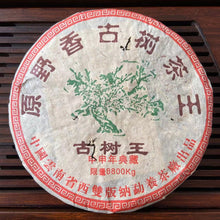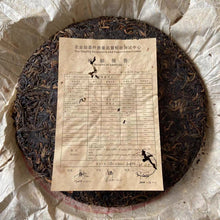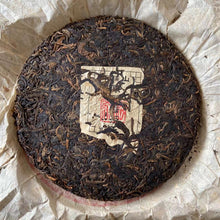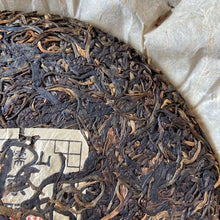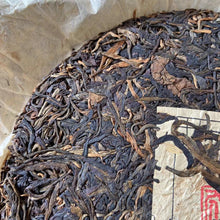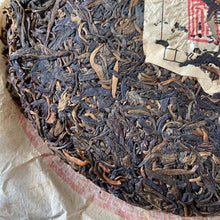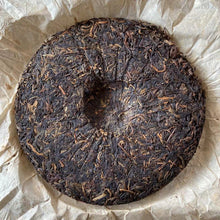
Origin:This exceptional Puerh Sheng Cha (Raw Puerh) originates from MengYang, a region known for its rich tea history and high-quality teas. The tea comes from ancient tea trees, which are often referred to in the industry as "Gu Cha Wang" or "Ancient Tea King," indicating the venerable age and esteemed status of the tea trees from which the leaves are harvested.
Processing:Crafted in 2004, the tea has been traditionally processed to maintain its raw, unfermented state. The leaves undergo minimal oxidation, preserving the natural essence and potential for aging. This Puerh cake is manufactured by compressing tea leaves into a traditional 357g bing (cake), a standard format for Puerh storage and aging.
Appearance:The cake presents a mosaic of dark green to brown hues, typical of an aged raw Puerh. The leaves might show signs of natural fermentation over the years, giving them a slightly darker tone and a more textured appearance compared to younger teas.
Aroma:Upon opening, one is greeted with an earthy, woodsy scent intertwined with hints of wildflowers and a slight mustiness, which is characteristic of well-aged Puerh. As the leaves are steeped, the aroma evolves, potentially revealing notes of camphor, aged wood, and a subtle sweetness reminiscent of dried fruits.
Flavor Profile:
-
Initial Taste: The first infusions bring forth a bold, slightly bitter taste, indicative of its raw nature, which then mellows into a more complex profile.
-
Mid-Infusions: As you progress through the infusions, expect a transition towards a smoother, richer taste. You might encounter layers of earthy flavors with undertones of dried fruit, a hint of bitterness that leads to sweetness, and perhaps a touch of medicinal camphor or mint.
-
Aging Potential: Over time, this tea should develop a deeper, more rounded flavor, with increased sweet notes, a smoother mouthfeel, and an enhanced huigan (returning sweetness).
Mouthfeel and Aftertaste:The tea leaves a lingering sensation on the palate, often described as 'huigan,' where a sweet, sometimes floral or fruity aftertaste returns, enhancing the overall drinking experience. The mouthfeel can be robust yet smooth, with a thickness that coats the mouth, characteristic of well-aged Puerh.
Storage:This tea has likely been stored in conditions that promote beneficial aging, such as in a controlled environment with stable humidity and temperature, to enhance its flavor complexity over time.
Recommendations:This MengYang "Yuan Ye Xiang - Gu Cha Wang" is best appreciated by seasoned Puerh drinkers who enjoy the depth and complexity that only time can bring to raw Puerh. It can be enjoyed now for its unique aged characteristics or stored for further maturation. When brewing, consider using traditional gongfu style for multiple quick infusions to appreciate the changing nuances of the tea.
Cultural Note:The name "Yuan Ye Xiang" or "Wild Flavor" hints at the tea's connection with nature, capturing the essence of the wild, ancient tea trees from which it is derived, celebrating both the heritage and the untamed wilderness of the tea mountain.
Guangzhou natural storage.











